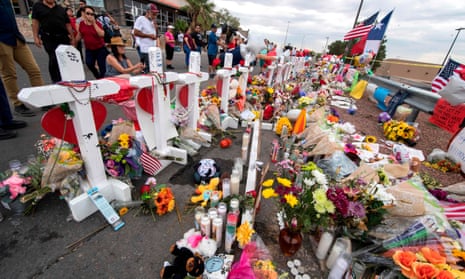Blaming gun violence on the mentally ill prevents America from solving its unique gun violence problem, and stigmatizes those with diagnoses, psychologists and psychiatrists warned following the El Paso and Dayton mass shootings.
Experts in mental health have repeated these lines for decades since the deadly school shooting at Columbine High School in Colorado, and made statements again Monday, after Donald Trump blamed mental illness for two back-to-back shootings in El Paso, Texas, and Dayton, Ohio, that left 31 people dead and dozens injured.
In an address to the nation, Trump said: “Mental illness and hatred pulls the trigger, not the gun.” He also called the gunman from Dayton, Ohio, a “twisted monster”, and both shootings “evil attacks”.
The leading associations of psychiatrists and psychologists both condemned the statement, while pointing to a defining characteristic of American life: easy access to guns.
“Blaming mental illness for the gun violence in our country is simplistic and inaccurate and goes against the scientific evidence currently available,” said Arthur C Evans Jr, CEO of the American Psychological Association.
“As we psychological scientists have said repeatedly, the overwhelming majority of people with mental illness are not violent,” said Evans. “And there is no single personality profile that can reliably predict who will resort to gun violence.
“Based on the research, we know only that a history of violence is the single best predictor of who will commit future violence. And access to more guns, and deadlier guns, means more lives lost.” Evans called on lawmakers to pass gun restrictions, including a limit on civilians’ access to assault weapons and high capacity magazines.
The US has become home to 31% of all mass shootings globally, and is also home to half of all the 650m civilian-owned guns in the world, despite having just 5% of the population, according to an analysis by Adam Lankford, criminology professor at the University of Alabama. In a comparison of 171 countries with more than 10 million people, only Yemen has a higher rate of mass shootings. It is ranked second in terms of firearms ownership per resident.
In the same analysis, rates of homicide and suicide rates varied among the 171 counties, indicating a lack of correlation between mental illness and firearms homicides.
Trump also asserted video games may be responsible for firearms deaths. However, Americans play at similar or even lower rates compared to other industrialized nations, failing to explain America’s extraordinarily high rate of mass shootings.
In his speech Monday, Trump also called for “involuntary confinement” of “mentally disturbed individuals” – it is unclear what he means by this. While mental illness does not explain the high incidence of mass shootings in America, experts largely agree America’s mental healthcare infrastructure is broken.
Beginning roughly in the 1960s, the movement to “deinstitutionalize” patients from state hospitals pushed the mentally ill into pharmaceutical, out-patient-based therapies.
It also resulted in a 95% decline in the number of long-term psychiatric beds available in the US, and a movement of the mentally ill from state-run hospitals to jails, emergency departments and homelessness. According to 2006 data from the Bureau of Justice Statistics, 55% of male and 73% of female inmates in state jails have a mental health problem.
Some psychiatrists, such as professor Dominic Sisti of the University of Pennsylvania, have called on governments to reintroduce public support for long-term psychiatric care.
“Asylums are a necessary but not sufficient component of a reformed spectrum of psychiatric services,” Sisti wrote in an editorial for the Journal of the American Medical Association. “A return to asylum-based long-term psychiatric care will not remedy the complex problems of the US mental health system, especially for patients with milder forms of mental illness who can thrive with high-quality outpatient care.
“Reforms that ignore the importance of expanding the role of such institutions will fail mental health patients who cannot live alone, cannot care for themselves, or are a danger to themselves and others,” Sisti wrote.
Republicans attempted, and failed, to further defund treatment for mental health by repealing the Affordable Care Act, better known as Obamacare. Obamacare expanded Medicaid, a health insurance program for the poor and disabled. Medicaid is responsible for one quarter of the nation’s mental health spending, according to the National Council for Behavioral Health. The program provides healthcare for 74 million Americans.
Republicans, including Ohio’s governor, this week have also called for “red flag laws” in response to the mass shootings, which have been passed in 17 states. These allow police to temporarily take custody of a person’s firearms if they are believed to be a risk to themselves or others, typically during a period of crisis. For example, a spouse could call the police and ask guns for a person’s firearms to be temporarily confiscated because of increasing threats. Then, a court would hear the case.
An American Psychiatric Association working group examined the laws in 2018, after Trump proposed enacting them at a federal level. There is limited data on their utility at preventing violence – just Connecticut and Indiana have reported data – but there is some evidence they can prevent suicide. The working group called for more research into other violence prevention.
In Connecticut, most people whose guns were confiscated were middle-aged married men, who had no prior history of mental illness and were not involved with the criminal justice system. An average of seven guns were seized per warrant.









